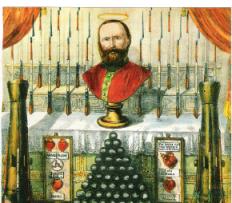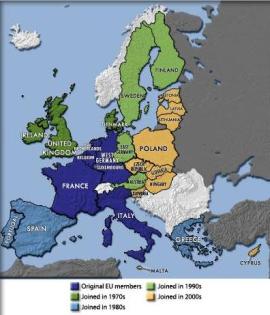![]()
Europe
|
Recently a new book came out titled: "Europe
- an idea takes shape." Here our Critical Investigation: |
Research Report: Conflict and
Ethnicity:
Research
Report: Ethnoclass in Eastern Europe. |
Below, the first partition of Poland by
the Eastern European monarchs, who are shown dividing the spoils. This signaled not only by the remaking of Eastern Europe, but
also resulted in the wars of Louis XIV, the first world wars of the modern era,
imperial and oceanic in their scope.
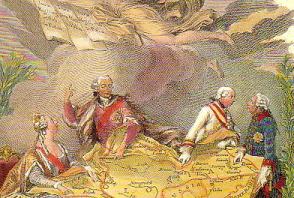
Religion and Modern Politics P.1: Bakunin's
Christianity
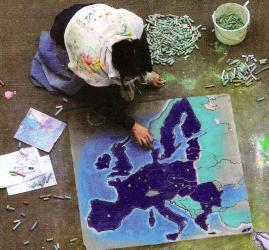

Religion and Modern Politics P.2: From 'New
Right' to Habermas Today
|
Many have
forgotten this, but Europe had its fair share of ‘revolutions’ and ‘political
religions’ “Kulturkampf,” it was called at the end of the 19th century,
almost identical to what by the end, of the 20th Century was called clash
of “Civilizations.” In Germany ‘Kultur’ was understood to be
Protestantism, an identification partly made to reinvigorate Protestantism
among a bourgeoisie that no longer attended church. As for ‘Kultur’ in
Belgium, in 1936 a liberal historian wrote that liberal “Brussels had no intention
of being trodden underfoot by thousands of clogs”, this being a reference to
the clog-shod Catholic -Flemish (similar to Dutch, who when employed were not
allowed to speak their native language) farmers, who flooded into the capital
city to protest against (French language) liberal policies. (Quoted in Winfried Becker, 'Liberale
Kulturkampf-Positionen and politischer Katholizismus,1983.) If one is looking for the intellectual progenitor
for "the cult of the personality”, look no further than Campanella. But,
hyper-nationalism, was not principally a phenomenon of the far Right, it was
enthusiastically embraced by many on the Left throughout much of the 19th
century. P.1: The New World of 'Sociology'.
Socialists
at first generally tried to get back to some sort of Christianity predating
Constantine. While Russian radicals, despairing of the tsars' fitful reforms,
moved from Christian reformism to evolve terrorist ideologies anticipating
al-Qaida, including suicide bombers. P.2: Signor Mazzini I Presume? Social Democrats, A Political
Religion Updated: P.4: The 1914
Clash of Civilisations True History
of the European Community, P.1: Its WWI Origin True History of the European
Community, P.2: Which Europe?
|
Recently a summit of EU leaders debated about the benefits
and flip-sides of the current 'European versions'of
'globalization'. By democratizing, elites credibly transfer political power
to the citizens, ensuring social stability. Democracy consolidates when
elites do not have strong incentives to overthrow it. These processes depend
on the strength of civil society, the structure of political institutions
plus the structure of the economy. What also had an influence is where
Britain had an economy-based empire and its goal was not to dominate the
world, realizing that they were a middle-weight country. The U.S., was not
created through economic dominance but crafted through political means, meaning
the political forces that are by some seen like empire building today, may
not last. In a protectionist Europe in the meantime, where large companies
faced little international competition and offered jobs for life the past
fifty years, a blend of capitalist enterprise and social concern with high
taxes, seemed a reasonable way. In fact despite hefty government spending on
social benefits, Finland tops global economies today. Finland however is also
well equipped to meet the challenges of an aging population, something that
is not the case of Belgium for example. P.1 Globalization and Economics: A Search for the
Holy Grail?: On a just released
(WWIII)Warsaw-pact map,
western Europe lay beneath a chilling overlay of large red mushroom clouds:
Soviet bombs rain down on cities from northern Denmark down to Brussels, the
political headquarters of Nato. Large red clouds
blot out cities such as Hamburg, Frankfurt, Stuttgart, Munich and Baden Baden, Haarlem, Antwerp and Charleroi, above the
Franco-Belgian border. On the map, smaller blue mushroom clouds showed
expected Nato targets - most of them relatively
precise attacks - including strikes on Warsaw and Prague. Cold War and Modern Historiography. |
24 April, 2010:
Belgian Government once more collapsed. A candid look at why the crisis in
Belgium threatens to tear the country apart. Including
major case study "From Belgium to Kososovo and
back".
Towards a New Sociology of Religious Nationalism P.1.
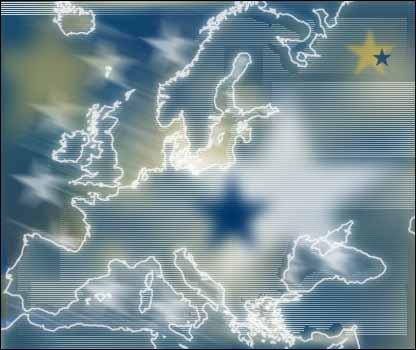
Towards a New Sociology of Religious Nationalism P.2.
Part 3-a: Albania, Austria, Belarus, Belgium, Bosnia and
Herzegovina, Bulgaria,Croatia, Cyprus, Czech
Republic, Denmark, Estonia, Finland, France, Germany, Hungary, Overview.
Part 3-b: Iceland, ltaly, Latvia,
Lithuania, Luxembourg, Macedonia, Malta, Moldova, The Netherlands, Norway,
Portugal, Romania, Russia, Serbia and Montenegro, Slovak Republic, Slovenia,
Spain, Switzerland, Ukraine.
William James, author
of the classic book The Varieties of Religious Experience, found that that they
were far more common than most atheists, and even most believers, had imagined.
From today’s scientific point of view however religious experiences on the
other hand are generated inside the brain, and that they are illusory. Not
intend on being a definite account yet, let us start with an overview from a
rational point of view.
The Politically Incorrect Guide to Religion P.1
The Future of
Democracies Around the World

For updates
click homepage here



